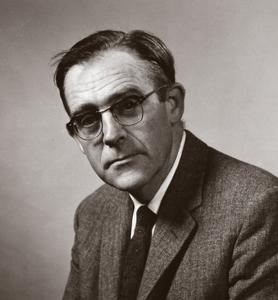Charles Stevenson (philosopher) facts for kids
Quick facts for kids
Charles Stevenson
|
|
|---|---|
 |
|
| Born |
Charles Leslie Stevenson
June 27, 1908 Cincinnati, Ohio, US
|
| Died | March 14, 1979 (aged 70) Bennington, Vermont, US
|
| Alma mater | |
|
Notable work
|
Ethics and Language (1944) |
| Spouse(s) |
|
| Children |
|
| Scientific career | |
| Institutions |
|
| Thesis | The Emotive Meaning of Ethical Terms (1935) |
| Doctoral students | Joel Feinberg |
| Influences | |
| Influenced |
|
Charles Leslie Stevenson (born June 27, 1908 – died March 14, 1979) was an American philosopher. He is best known for his ideas in ethics, which is the study of moral principles, and aesthetics, which is the study of beauty and art.
About Charles Stevenson
Charles Stevenson was born in Cincinnati, Ohio, on June 27, 1908. He went to several famous universities. He earned a degree in English literature from Yale University in 1930. Then, he studied philosophy at Jesus College, Cambridge in England, getting another degree in 1933. Finally, he received his highest degree, a Doctor of Philosophy, from Harvard University in 1935.
While studying at Cambridge, he learned from important philosophers like Ludwig Wittgenstein and G. E. Moore. Stevenson taught at Yale University from 1939 to 1944. During World War II, he even taught math to naval recruits. His ideas about "emotivism" were quite new at the time, and because of them, his teaching job at Yale was not continued in 1944.
After Yale, he received a special grant called a Guggenheim fellowship. He spent time at other universities like Berkeley, Pomona, and Chicago. In 1946, he became a professor at the University of Michigan, where he taught until 1977. One of his well-known students there was Joel Feinberg.
Stevenson is famous for developing a philosophical idea called emotivism. He wrote about this in his papers "The Emotive Meaning of Ethical Terms" (1937) and "Persuasive Definitions" (1938). He also wrote a book called Ethics and Language (1944). In his work, he explained that when we use ethical words, we are not just stating facts. We are also expressing our feelings and trying to influence others.
Charles Stevenson passed away on March 14, 1979, in Bennington, Vermont.
Stevenson's Ideas on Ethics
Stevenson's main contribution to philosophy was his detailed explanation of emotivism. This idea suggests that when people make moral statements, like "Stealing is wrong," they are doing two things:
- They are expressing their own feelings about the action.
- They are trying to make others feel the same way or act in a certain way.
For example, if someone says "That movie is good," they are expressing their positive feeling about the movie. They are also trying to encourage you to feel good about it too, or to go watch it.
Stevenson believed that disagreements about moral questions are different from disagreements about facts. You can use science to check facts, but you can't use it to prove if something is "good" or "bad." He said that moral words are "magnetic" because they encourage people to act. For instance, saying "Helping others is good" makes people want to help.
In his book Ethics and Language, Stevenson explained that ethical sentences show the speaker's feelings. But more importantly, they also have a "command" part. This part tries to change how the listener feels or acts. He used the word attitudes to describe our basic feelings and beliefs. He showed that when people disagree on moral issues, it's often because they have different beliefs or attitudes.
See also

- In Spanish: Charles Leslie Stevenson para niños

